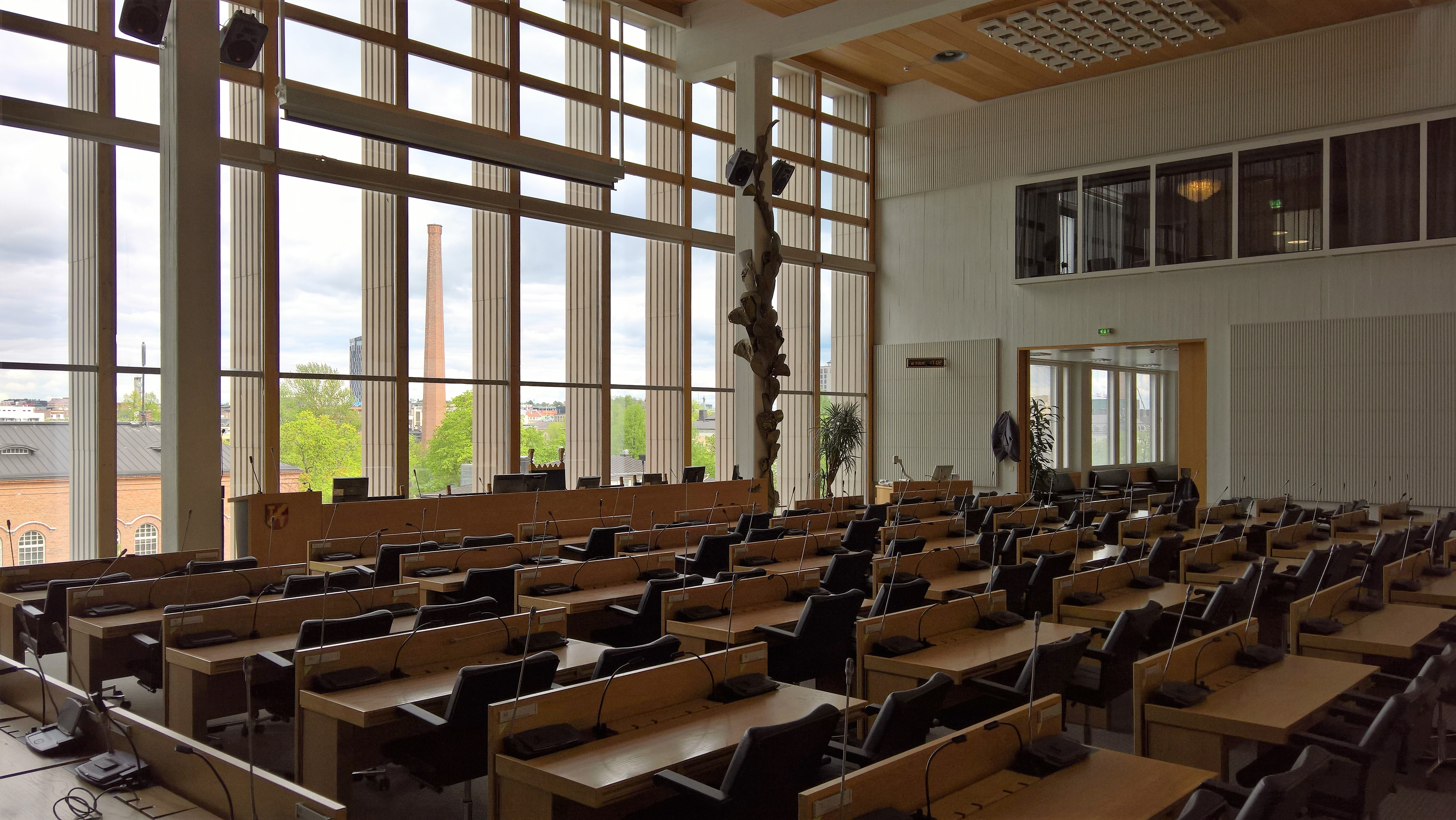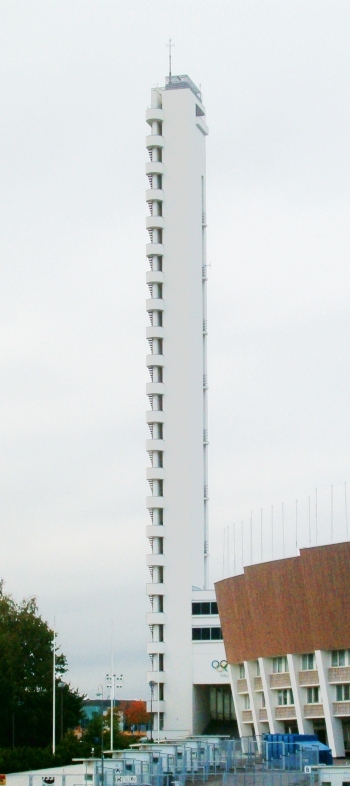|
Storting Building
The Storting building ( no, Stortingsbygningen) is the seat of the Storting, the parliament of Norway. The building is located at 22 Karl Johans gate in central Oslo, Norway. It was taken into use on 5 March 1866 and was designed by the Swedish architect Emil Victor Langlet. History Following the establishment of the Parliament of Norway in 1814, which had happened at a private home belonging to Carsten Anker in Eidsvoll, the newly established legislature started meeting at Christiania lærde Skole at Tollbodgaten and Dronningsgate. From 1854, the legislature started using the grand hall at the Royal Frederick University. However, proposals of an own parliament building had arisen. The parliament voted down a government proposal to create such a building in 1833, but in 1836, the work to establish a permanent building started. Twelve lots in central Oslo were combined, located between the Royal Palace and Oslo East Station. The government decided to build in the Palace Park, ... [...More Info...] [...Related Items...] OR: [Wikipedia] [Google] [Baidu] |
Eclecticism In Art
Eclecticism is a kind of mixed style in the fine arts: "the borrowing of a variety of Art movement, styles from different sources and combining them" . Significantly, Eclecticism hardly ever constituted a specific style in art: it is characterized by the fact that it was not a particular style. In general, the term describes the combination in a single work of a variety of influences—mainly of elements from different historical styles in architecture, painting, and the graphic arts, graphic and decorative arts. In music the term used may be either Eclecticism in music, eclecticism or polystylism. In the visual arts The term eclectic was first used by Johann Joachim Winckelmann to characterize the art of the The Carracci, Carracci, who incorporated in their paintings elements from the Renaissance art, Renaissance and Art in ancient Greece#Classical, classical traditions. Indeed, Agostino Carracci, Agostino, Annibale Carracci, Annibale and Lodovico Carracci had tried to combine in t ... [...More Info...] [...Related Items...] OR: [Wikipedia] [Google] [Baidu] |
National Archival Services Of Norway
The National Archival Services of Norway ( no, Arkivverket) is a Norwegian government agency that is responsible for keeping state archives, conducts control of public archiving and works to preserve private archives. It is subordinate to the Ministry of Culture and Church Affairs and consists of the National Archive (), eight regional state archives () and The Sámi Archives (). The organization has 190 employees and about of materials. The oldest complete document is from 1189. It is a letter (a so-called diploma) issued on 28 January 1189 by Pope Clement III (1187-1191) to all clergymen in Norway. The National Archive is located at Sognsvann in Oslo and preserves all central government papers from when they become 25 years old, as well as some archives from private individuals, companies and organizations. The National Archive is also responsible for control. The state archives are responsible for local and regional government and state agencies, as well as archives from pr ... [...More Info...] [...Related Items...] OR: [Wikipedia] [Google] [Baidu] |
Legislative Buildings In Europe
A legislature is an assembly with the authority to make laws for a political entity such as a country or city. They are often contrasted with the executive and judicial powers of government. Laws enacted by legislatures are usually known as primary legislation. In addition, legislatures may observe and steer governing actions, with authority to amend the budget involved. The members of a legislature are called legislators. In a democracy, legislators are most commonly popularly elected, although indirect election and appointment by the executive are also used, particularly for bicameral legislatures featuring an upper chamber. Terminology The name used to refer to a legislative body varies by country. Common names include: * Assembly (from ''to assemble'') * Congress (from ''to congregate'') * Council (from Latin 'meeting') * Diet (from old German 'people') * Estates or States (from old French 'condition' or 'status') * Parliament (from French ''parler'' 'to speak') By ... [...More Info...] [...Related Items...] OR: [Wikipedia] [Google] [Baidu] |
Lagting (Norway)
The Storting ( no, Stortinget ) (lit. the Great Thing) is the supreme legislature of Norway, established in 1814 by the Constitution of Norway. It is located in Oslo. The unicameral parliament has 169 members and is elected every four years based on party-list proportional representation in nineteen multi-seat constituencies. A member of Stortinget is known in Norwegian as a ''stortingsrepresentant'', literally "Storting representative". The assembly is led by a president and, since 2009, five vice presidents: the presidium. The members are allocated to twelve standing committees as well as four procedural committees. Three ombudsmen are directly subordinate to parliament: the Parliamentary Intelligence Oversight Committee and the Office of the Auditor General. Parliamentarianism was established in 1884, with the Storting operating a form of "qualified unicameralism", in which it divided its membership into two internal chambers making Norway a de facto bicameral parliament ... [...More Info...] [...Related Items...] OR: [Wikipedia] [Google] [Baidu] |
Plenary Chamber
A debate chamber is a room for people to discuss and debate. Debate chambers are used in governmental and educational bodies, such as a parliament, congress, city council, or a university, either for formal proceedings or for informal discourse, such as a deliberative assembly. When used for legislative purposes, a debate chamber may also be known as a council chamber, legislative chamber, or similar term. Some countries, such as New Zealand, use the term debating chamber as a formal name for the room that houses the national legislature. Debating Debating can happen almost anywhere. Whether informal or structured as a discourse between select individuals or small groups with an audience, debates often occur with an audience. The debate does not ''directly'' involve the audience as they are not participants - they may even be remote, watching on television. The ''debating chamber'' is where the debate participants engage: the stage, panel or council table, or the presentation ... [...More Info...] [...Related Items...] OR: [Wikipedia] [Google] [Baidu] |
Granite
Granite () is a coarse-grained (phaneritic) intrusive igneous rock composed mostly of quartz, alkali feldspar, and plagioclase. It forms from magma with a high content of silica and alkali metal oxides that slowly cools and solidifies underground. It is common in the continental crust of Earth, where it is found in igneous intrusions. These range in size from dikes only a few centimeters across to batholiths exposed over hundreds of square kilometers. Granite is typical of a larger family of ''granitic rocks'', or ''granitoids'', that are composed mostly of coarse-grained quartz and feldspars in varying proportions. These rocks are classified by the relative percentages of quartz, alkali feldspar, and plagioclase (the QAPF classification), with true granite representing granitic rocks rich in quartz and alkali feldspar. Most granitic rocks also contain mica or amphibole minerals, though a few (known as leucogranites) contain almost no dark minerals. Granite is nearly alway ... [...More Info...] [...Related Items...] OR: [Wikipedia] [Google] [Baidu] |
Location «Max Manus», Stortinget
In geography, location or place are used to denote a region (point, line, or area) on Earth's surface or elsewhere. The term ''location'' generally implies a higher degree of certainty than ''place'', the latter often indicating an entity with an ambiguous boundary, relying more on human or social attributes of place identity and sense of place than on geometry. Types Locality A locality, settlement, or populated place is likely to have a well-defined name but a boundary that is not well defined varies by context. London, for instance, has a legal boundary, but this is unlikely to completely match with general usage. An area within a town, such as Covent Garden in London, also almost always has some ambiguity as to its extent. In geography, location is considered to be more precise than "place". Relative location A relative location, or situation, is described as a displacement from another site. An example is "3 miles northwest of Seattle". Absolute location An absolute locati ... [...More Info...] [...Related Items...] OR: [Wikipedia] [Google] [Baidu] |
Nils Holter
Nils is a Scandinavian given name, a chiefly Norwegian, Danish, Swedish and Latvian variant of Niels, cognate to Nicholas. People and animals with the given name * Nils Bergström (born 1985), Swedish ice hockey player *Nils Björk (1898–1989), Swedish Army lieutenant general *Nils Dacke (died 1543), Swedish rebel * Nils-Joel Englund (1907–1995), Swedish cross-country skier *Nils Ericson (1802–1870), Swedish inventor and engineer *Nils Frahm (born 1982), German pianist and producer *Nils Frykdahl, American musician * Nils Gründer (born 1997), German politician *Nils Hald (1897–1963), Norwegian actor * Nils Haßfurther (born 1999), German basketball player * Nils-Göran Holmqvist (born 1943), Swedish politician *Nils Kreicbergs (born 1996), Latvian handball player *Nils Liedholm (1922–2007), Swedish footballer and coach *Nils Lofgren (born 1951), American musician * Nils Lorens Sjöberg (1754-1822), Swedish officer and poet *Nils Mittmann (born 1979), German basketball ... [...More Info...] [...Related Items...] OR: [Wikipedia] [Google] [Baidu] |
Funkis
In architecture, functionalism is the principle that buildings should be designed based solely on their purpose and function. This principle is a matter of confusion and controversy within the profession, particularly in regard to modern architecture, as it is less self-evident than it first appears. The theoretical articulation of functionalism in buildings can be traced back to the Vitruvian triad, where ''utilitas'' (variously translated as 'commodity', 'convenience', or 'utility') stands alongside ''firmitas'' (firmness) and ''venustas'' (beauty) as one of three classic goals of architecture. Functionalist views were typical of some Gothic Revival architects. In particular, Augustus Welby Pugin wrote that "there should be no features about a building which are not necessary for convenience, construction, or propriety" and "all ornament should consist of enrichment of the essential construction of the building". In the wake of World War I, an international functionalist arc ... [...More Info...] [...Related Items...] OR: [Wikipedia] [Google] [Baidu] |
Josef Terboven
Josef Terboven (23 May 1898 – 8 May 1945) was a Nazi Party official and politician who was the long-serving ''Gauleiter'' of Gau Essen and the ''Reichskommissar'' for Norway during the German occupation. Early life Terboven was born in Essen, the son of minor landed gentry. The family name comes from the Low German ''dar boven'' ("up there"), referring to a farmstead on a hill. Josef Terboven attended ''volksschule'' and ''realschule'' in Essen until 1915 and then volunteered for military service in the First World War. He served with ''Feldartillerie Regiment'' 9 and then with the nascent air force. He was awarded the Iron Cross, 1st and 2nd class, and attained the rank of Leutnant before being discharged on 22 December 1918. He studied law and political science at the University of Munich and the University of Freiburg, where he first got involved in politics. He dropped out of the university in 1922 without earning a degree and trained as a bank official in Essen, working a ... [...More Info...] [...Related Items...] OR: [Wikipedia] [Google] [Baidu] |
Reichskommissar
(, rendered as "Commissioner of the Empire", "Reich Commissioner" or "Imperial Commissioner"), in German history, was an official gubernatorial title used for various public offices during the period of the German Empire and Nazi Germany. German Empire Domestic In the unified German Empire (after 1871), Reichskommissars were appointed to oversee special tasks. For instance, there was a Reichskommisar for emigration (''Reichskommissar für das Auswanderungswesen'') in Hamburg. Presumably the same title is rendered as "German Imperial Commissioner" in the case of Heligoland, a strategically located once-Danish island in the North Sea, formally handed over to Germany by the UK on 9 August 1890 (under the Heligoland–Zanzibar Treaty) and on 15 December 1890 formally annexed to Germany (after 18 February 1891 part of the Prussian province of Schleswig-Holstein): 9 August 1890 – 1891 Adolf Wermuth (b. 1855 – d. 1927) Colonial The title of Reichskommissar was used during the Germ ... [...More Info...] [...Related Items...] OR: [Wikipedia] [Google] [Baidu] |
World War II
World War II or the Second World War, often abbreviated as WWII or WW2, was a world war that lasted from 1939 to 1945. It involved the vast majority of the world's countries—including all of the great powers—forming two opposing military alliances: the Allies and the Axis powers. World War II was a total war that directly involved more than 100 million personnel from more than 30 countries. The major participants in the war threw their entire economic, industrial, and scientific capabilities behind the war effort, blurring the distinction between civilian and military resources. Aircraft played a major role in the conflict, enabling the strategic bombing of population centres and deploying the only two nuclear weapons ever used in war. World War II was by far the deadliest conflict in human history; it resulted in 70 to 85 million fatalities, mostly among civilians. Tens of millions died due to genocides (including the Holocaust), starvation, ma ... [...More Info...] [...Related Items...] OR: [Wikipedia] [Google] [Baidu] |








